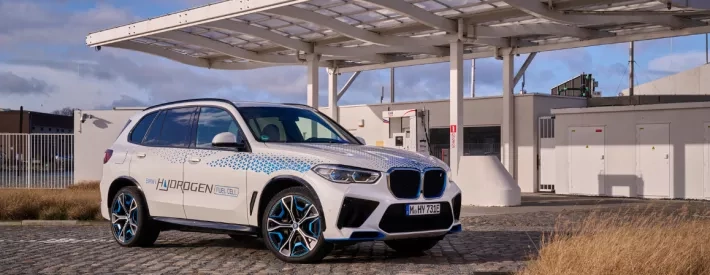Why Delphi is upskilling ready for a hydrogen fuelled future

Hydrogen is a fuel that could help power the automotive sector in the future. There are some big hurdles to overcome but Delphi is already preparing for a future that includes the fuel, building on combustion and EV skills to make sure the industry is ready.
But why is the company so focused on a technology that still hasn’t penetrated the market yet?
Luke Garratt, UK and Nordics Technical Services Manager at Delphi explains: “The biggest thing for Delphi as a company to be involved in this is because we are pioneering it. We're the global leader in producing hydrogen injectors for internal combustion. We produce injectors on a manufacturing level for internal combustion for large heavy-duty off-road construction applications. All of our test lanes and prototype engine rigs, they're one of a kind [so] a lot of our engineers are well-versed in working with hydrogen, all the dangers involved, and the little idiosyncrasies that come with hydrogen as a combustible fuel rather than fossil fuels.”
And because the company works with hydrogen technology in the engineering sphere, in theory it should make it simpler to transfer the knowledge over to its training. Though working with other organisations will be crucial to delivering the right skills to those who need them most, while also highlighting why people and businesses need to invest in them even at this early stage in hydrogen’s development.
“People maybe need training to fully understand the benefits as a business or as an individual. In terms of where we see ourselves with training in workshops, until there are vehicles that are released into the aftermarket, there's technically not really a need. [But] it will always pay technicians to be ahead of the curve and to understand what the future of fuelling looks like so that they can be ready to embrace it when the time's right,” says Garrett.
What the final hydrogen training looks like it still to be finalised, the IMI offers a Level 1 Award in Hydrogen Vehicle Awareness and Delphi also delivers a two-day ‘advanced hydrogen’ training programme to give a deeper understanding on the principles of hydrogen fuel cell and hydrogen internal combustion operation. But there’s more to be covered.
“We know what the criteria is working with EV and high-voltage so that's been applied across the hydrogen qualification but in terms of actually storing hydrogen in tanks and the specific health and safety requirements for your workshop, what that's going to look like, nobody really knows,” says Garrett.
The upskilling conundrum
The issue that the industry could face is a lack of enthusiasm to take on hydrogen training, something that’s been sometimes painfully apparent with EV qualifications, even with the number of electrified vehicles growing.
“We've seen first-hand the take-up on EV and hybrid training [isn’t] as much as it should be. There are still a lot of garages and workshops out there that go, ‘It's not going to happen to me in my lifetime. I'm not bothered’,” says Garrett.
Businesses and individuals ignoring the market shift is only one issue, hydrogen – specifically hydrogen fuel cell vehicles – could also count complexity as a barrier to people taking on new skills.
“You're taking two new complex technologies: [the] hydrogen fuel cell itself and then EV batteries and high-voltage, combining them together in one, and then all of a sudden you've got a very, very unfamiliar technology to work with,” says Garrett.
Although if you’re a technician that’s already worked through the array of EV courses and qualifications on offer, that barrier is more easily overcome.
Not all hydrogen vehicles will be fuel cells, some will remain combustion, a technology a lot more familiar to the industry, meaning the skills needed to work on it are more easily transferable and perhaps less intimidating. And Delphi has a development vehicle in Europe to show how it works.
“The hydrogen van is one of the first of its kind. It's a converted 2.2 diesel Peugeot Expert with hydrogen tanks in the back. There's no difference in the way it sounds, looks, or runs. You look in the engine bay and it looks like an engine,” says Garrett.
You can’t ignore the challenges hydrogen still needs to overcome to make it into the market. But it isn’t just technical hurdles, it’s making sure the industry is equipped with the right skills to make sure any vehicles that hit the mainstream can be maintained. It’s why Delphi is pushing forward with its offering now, so it’s ready for the future.




